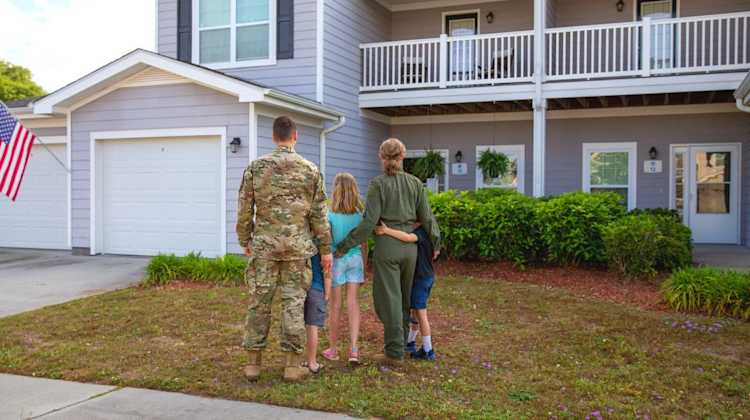5 Commitments That Pull Me Out of a PCS Depression
by AmeriForce Media - November 2nd, 2021

This article was originally published in Military Families Magazine. Read the original article on MilitaryFamilies.com. Follow Military Families on Instagram.
Summer 2020 brought move number eight, nine if you count the move I made as the wide-eyed girlfriend in 2005. The truth is, with a pandemic hitching a ride, this move worried me. This time my mental checklist for integrating into our new duty station didn’t look familiar. No unit functions. No neighborhood gatherings. No sports sign-ups. No meet the teacher. How would we safely explore our new area? How would we find our circle? And most importantly, how long would it take? I was concerned.
There is a heaviness that comes with moving. As an introvert, starting over is daunting, exhausting and overwhelming. I’m awkward with small talk and then have an equally inarticulate tendency to overshare as I fill dead air time with a new acquaintance. It’s a dance I know well and do not enjoy.
As we settled into our new location, things were going well. And then what I like to call “the valley” came. It always did shortly after we got settled into our new location. As with previous moves, I was ok initially. Then, once the boxes were gone and a new normal was forming, I got edgy and sad; depressed even. The cumulative impact of military life and relocation always catches up with me. With each move, it sends me into a valley from which I’d spend the next three to six months climbing out. I don’t know what made me step back and notice the pattern, but something did. And I was grateful.
At some point, I had become keenly aware that each PCS transition impacted my roles as mom, wife, neighbor and friend. Now I couldn’t ignore it so I set out to change it. I found that there are five “commitments” that transformed my PCS experience, ensuring that my valley was both less deep and less wide.
Commit to honesty
Committing to honesty meant admitting, to myself and my husband, how hard prior transitions had been. And it meant being honest with myself about the detrimental impacts of hiding out, even if it was more comfortable. As we settled into a new life in the Pacific Northwest, I had to admit to myself that I was actually sad about things from my last duty station— our East Coast friends and family, my favorite coffee shop and the routine we’d grown accustomed to. Being honest with myself created the space for some grace and a new approach.
Commit to connection
With no functions or “forced family fun” to attend, building connection was something I had to own. I chose to tackle it in three ways.
– Say yes. One day at a time, I had to say yes more than I said no. Yes, to the neighbor who invited me to her garage gym. Yes, to the new friend who asked me hiking. Saying “yes” helped me to make more connections than I otherwise would have.
– Reach back. In those early weeks, I picked one friend to connect with each week; ones I hadn’t talked to in far too long. Those phone calls were such a gift to my soul. I got off the phone each time, lighter, happier, more at peace in our new place.
– Reconnect locally. In military life, the more moves you make, the more old friends and acquaintances you are likely to have at any given location. I reached out to a few old friends and reconnected for playdates, hikes and lunches.
As a staunch introvert, seeing these three commitments through wasn’t my typical pattern, but it was vital for my mental health and an incredible strengthening effort for these friendships.
Commit to personal development
My instincts told me that personal development was a crucial element in lessening my valley for this PCS. After 16 years of military life, I was a bit “stuck” – stuck in old habits and stuck in old thinking. To get unstuck, I gifted myself a few life coaching sessions. I chose the fantastic Corie Weathers, a fellow military spouse and life coach, and worked through her Strengths-Based Coaching program. Seeing myself through a completely different lens and understanding my strengths in a new way helped ensure I was using the best version of myself to guide our family through this transition. I’ve since learned that free Health & Wellness Coaching exists through Military OneSource, so committing to personal development doesn’t always mean a financial investment.
Commit to new routines that prioritize you
Sometimes it’s easy to revert to old habits— not because they work but because they are comfortable. Prioritizing a new routine, for me, meant committing to two walks a day with our new pup, Cinnamon. Yes, they were for her, but those walks became the perfect opportunity to devour podcasts and audiobooks that interested me and furthered my personal development journey. Showing up for those who need me is tied to showing up, first, for myself. And what better time to start a new routine than during a PCS transition. I know it’s not always easy, but challenge yourself to find five minutes to take a breath, write or walk.
Commit to sleep and nutrition
Good nutrition and adequate sleep are always game-changers, but both get off track quickly during and after a PCS. The weeks leading up to a PCS are long and busy. So, when we finally arrive, I’m exhausted. And then it’s the unpacking, decorating, schedules and adjusting. My patience, mood and willingness to try new things usually have roots in how I’m caring for my mind and body. When things seem off track, I ask two questions: What am I eating? and how am I sleeping? Checking in with my body and what it needs is one way to protect my mental health and ensure a smooth PCS and a calmer military life experience. So, no more Netflix binges or late-night scrolling for this girl.
Moving coast-to-coast during a pandemic was straight-up hard. In a way, knowing this move was unique forced me to approach the entire thing differently. The lessons I learned are ones I wish I’d had already known for the last eight moves. And if they can help anyone else, well, that’s what we do as military spouses— we pay it forward and use our experience to help others.







